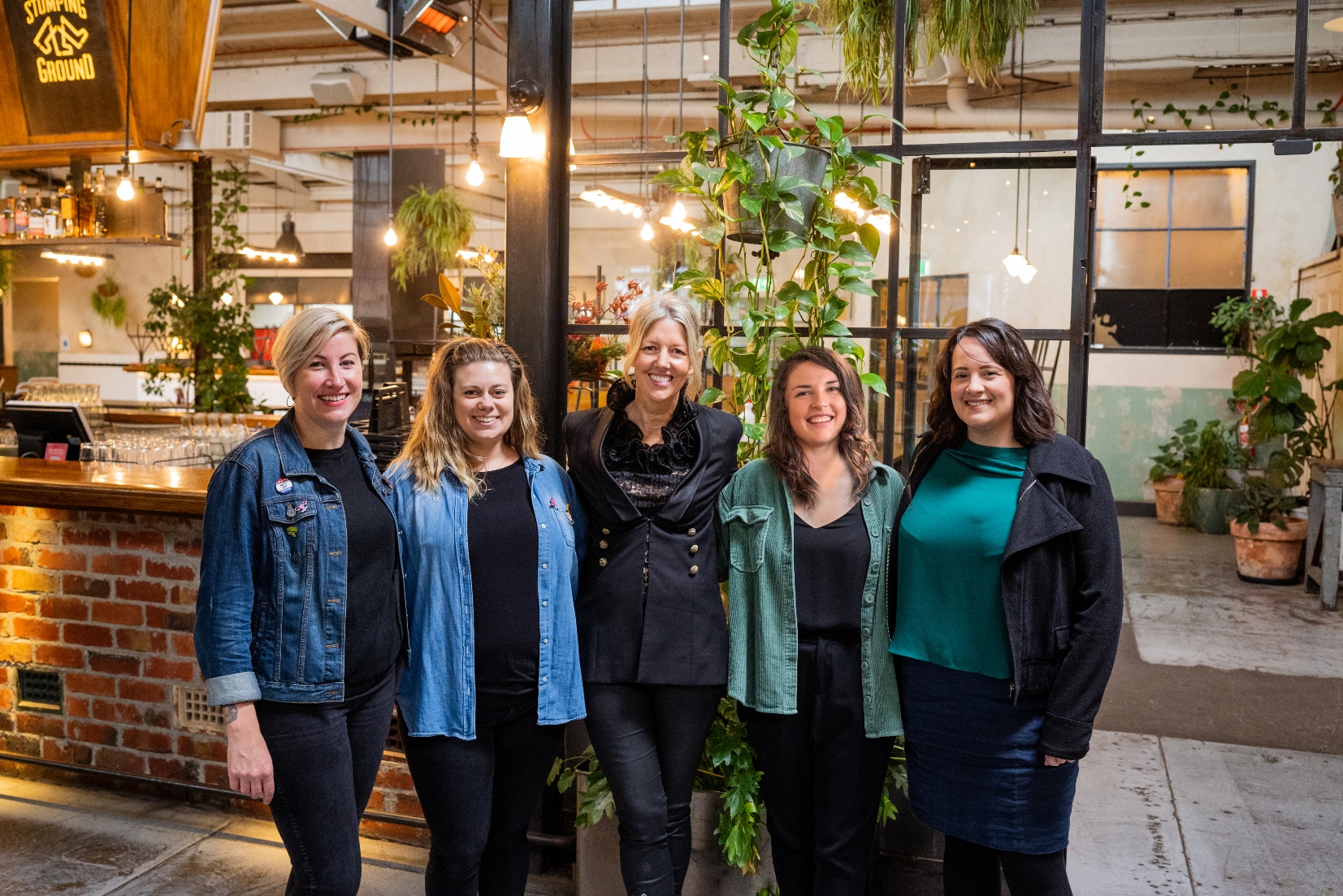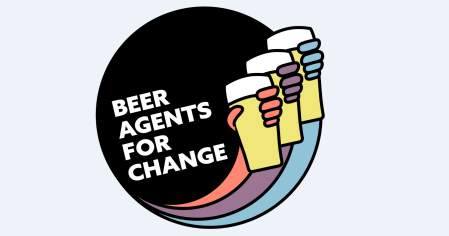
Several prominent women in the Australian beer industry are calling for a major stakeholder response to help enable a safer and more diverse work place as “confronting” findings from a survey they conducted were released this week.
Consisting of Two Birds Brewing’s co-founder Jayne Lewis, Pink Boots Society Australia president Tiffany Waldron, beer educator, writer and judge Kirrily Waldhorn, founder of brand agency Craft Instinct Jessie Jungalwalla and Stomping Ground Brewing’s head of people and culture Roxy Boubis (pictured in that order above), the group Beer Agents for Change (BAFC) launched their Australian Beer Industry Diversity Survey in July to determine a baseline understanding of where the industry sat in terms of workplace experience and diversity.
The results were announced on November 16 and showed almost 40% of the 220 respondents (53% male/47% female) who work in the beer industry, either directly or indirectly, had been abused or harassed at work, with 20% experiencing sexual abuse or harassment and 20% suffering abuse or harassment due to their gender. Of those who had experienced abuse or harassment, 90% were women, while 75% of respondents felt senior leadership roles in the industry weren’t representative of the broader community. The term “boy’s club” was mentioned 32 times in the survey’s open commentary.
The results also showed the issues the industry faces go beyond gender, with a lack of ethnic diversity being highlighted and that less than a quarter of businesses acknowledge Indigenous custodianship of land and names at key sites.
The survey will now be run annually to track progress.
Read the full Australian Beer Industry Diversity Survey results here and the accompanying media release here.
Speaking with Beer & Brewer, Tiffany said BAFC hope the results are seen by those in leadership roles in the industry and that they can acknowledge a problem exists and begin rectifying it, but also realise there are benefits to be gained by embracing a more diverse culture.
“For us, the results are confronting but not surprising.” Tiffany said. “But ultimately our hope is that industry stakeholders see them and see that if they thought there wasn’t a problem before they now know there is.
“There are almost 100 people that answered the survey who have experienced abuse and harassment in the workplace. That is a horrifying lot of people.”
With over half the respondents saying they would use an external whistleblower service to raise negative workplace experiences, Tiffany said the establishment of such a platform was paramount but that it needed to be industry-driven.
“We will be the first to say that we don’t have all the answers and (the intention of this survey) was to set the benchmark so that we can all work towards change. But a third party whistleblower service is something that we’ve already started doing research in to. We have a pretty good idea of what needs to be done, it’s just a matter of finding the right allies and the right sponsors to bring it to life.
“For a platform like this, that needs to be established, who is the right organisation to manage it to make sure it’s done properly?
“We have the benefit of seeing what some organisations in the US have done. We don’t have to reinvent the wheel here and these types of organisations already exist in Australia. They exist in Universities. They exist in big businesses. It’s now just a matter of being able to tap into it from a collective industry point of view rather than individual organisations.”

BAFC was established in the wake of Brienne Allan’s public callout for stories of harassment on her Instagram account back in May this year which received a flood of allegations that sent shockwaves through the North American and European craft beer industries.
The fallout was soon felt in Australia also, with The Crafty Pint publishing a story that exposed assault and abuse allegations in the industry here and which pleaded for people to speak out loudly against harassment.
With such serious allegations in the public domain, Tiffany said the lack of solidarity on the issue from the wider local craft beer industry to date had been largely disappointing.
“Knowing that that story was coming out on The Crafty Pint, and we all lent our voices to that story as well, it’s been really disappointing seeing really very little coming from the industry as a whole.
“It’s been noted which breweries did make a statement and we should all really appreciate those that did. But it’s been so few. And it feels that (sections of the industry) have said ‘if we don’t talk about it, maybe it will go away’.
“It’s been good to have the support of some that have said ‘this conversation is not over yet’.”
While BAFC feel many tangible changes must be driven collectively by those that work within the industry, Tiffany said the group were already embarking on a number of their own initiatives that would allow individuals and groups to align with their same values.
Details of their Pledge for Diversity and Inclusion will be released soon, including recordings of some industry figureheads making the pledge, while they were looking to provide varying types of resources to enable better education around inclusion.
Up until their survey results were released this week those behind BAFC had kept their anonymity, with Tiffany saying they initially did so because they “didn’t know where the journey was going and what exactly was needed”. But having now stepped forward she hopes the combined weight of the group’s 60-years of industry experience will help push their message.
“Basically, in the end, we felt we wanted to take personal accountability and lend our own voices to what is happening. We’ve worked really hard to get this survey out but all we’ve really done is push the cart out. Now we just need to make sure it keeps rolling.”
For further reading on this issue, BAFC founders Tiffany, Jayne and Kirrily, as well as the IBA’s Kylie Lethbridge, spoke with the ABC for this piece.
